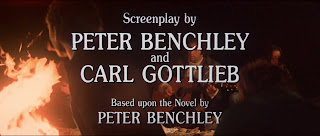The screenplay credit - which appears over the image of a boy roasting something in the camp fire - names only two of the script's many contributors: Peter Benchley and Carl Gottlieb. Benchley, whose surname has alphabetical superiority, is listed above Gottlieb, and he is afforded a further 'Based upon the Novel by' credit in a smaller font at the bottom of the screen.
The credit links the two men with the conjunction 'and' and that might suggest the screenplay was a work of collaboration, the two men sitting across a shared desk, bouncing ideas off each other and coming up with one final agreed text. This was, after all, the chosen method of great screen collaborators Billy Wilder and I.A.L Diamond, who lent their own working practices to the characters of Joe Gillis and Betty Schaefer in Sunset Boulevard. Alfred Hitchcock also saw the writing of the screenplay as a collaborative process, and, even though he never took a screenwriting credit, he helped to shape the scripts of his movies through extended story conferences with a variety of scriptwriters.
In the case of Jaws, however, Benchley and Gottlieb were never even in the same room, let alone at the same desk. Perversely, according to modern Hollywood convention, the presence of the word 'and' in a screenwriting credit is an indication that the writers have worked on the project separately. Only if their names are joined by an ampersand (&) does it mean that they worked as equal partners.
When Benchley signed away the movie rights, a clause in the contract gave him the right to produce his own version of the screenplay. There is a final draft credited to the novelist online, and - particularly in the first act - it contains whole scenes and some lines of dialogue that made it into the final movie. For the most part though, it is an uneven and clunky piece of work. The characters are unappealing and their speech patterns seem forced and unnatural. Here, for example, is Larry Vaughn speaking to Brody about keeping the beaches open: "I just want you aware of what you're doing before you tinker with the life blood of all those sage and discriminating souls who elected you."
Carl Gottlieb, whose experience in improv had given him an ear for dialogue, was able to convey more meaning in shorter sentences ("Amity is a summer town. We need summer dollars."). On location, he recorded the lines improvised by the actors in rehearsals and then worked them into the script - the most famous example being the bigger boat quip, which Roy Scheider came up with. Dreyfuss also improvised bits of business (crushing the Styrofoam coffee cup), and Shaw, who was a published novelist and playwright, produced his own version of the Indianapolis speech.
The exact authorship of the Jaws screenplay has been disputed over the decades, each and every contributor providing their own Rashomon-like perspective on the creative process. Playwright Howard Sackler, who was briefly hired to do a rewrite on the strength of his dramatic craftsmanship and his knowledge of scuba diving, supposedly made it a condition of his contract that he would not receive any credit. Was this an act of genuine modesty, or was he simply protecting his Pulitzer-prize-winning reputation? John Milius - Spielberg's macho-movie director buddy - contributed ideas and dialogue over the telephone. His most imaginative contribution to the movie, however, seems to have been in his retrospective and highly selective memories of what he wrote. Spielberg says he himself wrote his own version of the script over one weekend - just as he had read Benchley's original manuscript over two days - but it seems none of the director's ideas for big scenes (including Quint roaring with laughter at a matinee showing of Moby Dick at Amity's local cinema) made it onto the screen.
Discounting the actors' contributions, a total of at least seven people can lay claim to having written part of the Jaws script. It's unlikely that we'll ever really know who wrote what, but, given William Goldman's much quoted aphorism about the trade of screenwriting, maybe it's best not to.
